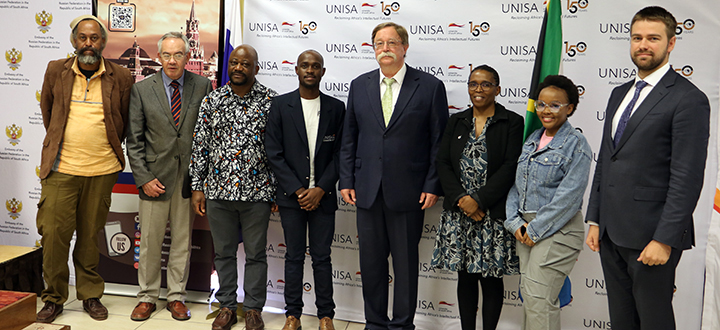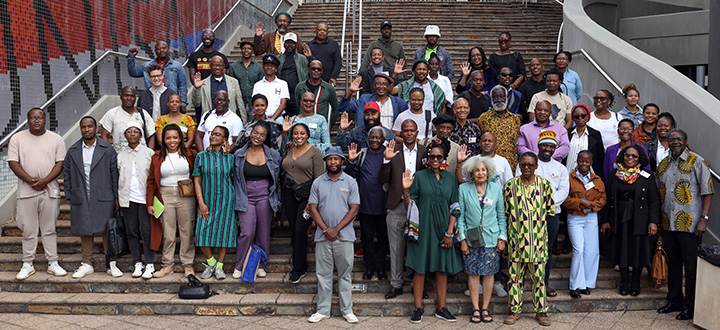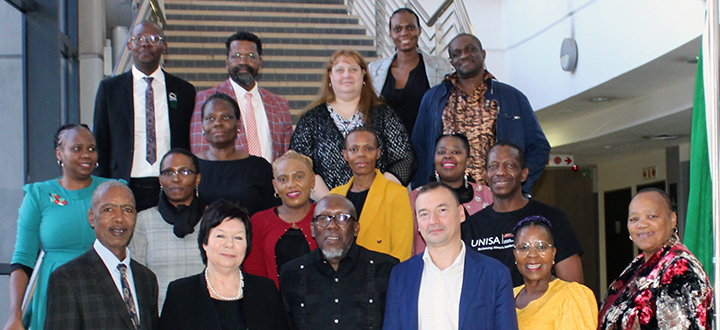News & Media
Distance education expert shares knowledge at Unisa's ODeL Conference
Dr Olaf Zawacki-Richter gave a keynote address on the third day of Unisa's ODeL Conference. Zawacki-Richter is the Director of the Center for Open Education Research (COER) at the University of Oldenburg in Germany. His keynote address was titled Systematic Reviews in Open Distance and Digital Education Research.
Sharing his latest research contributions, Zawacki-Richter advised 177 attendees at the conference that it is highly impossible to publish small when one conducts a systematic review study. His presentation did not only touch on academic publishing; he also spoke on systematic review methodology. He further said search strategies of systematic reviews are complex, intensive, and demanding. Zawacki-Richter demonstrated the exhaustion of the process through systematic review projects focusing on higher education.

Dr Olaf Zawacki-Richter (Dean of the Faculty of Education and Social Sciences, University of Oldenburg)
Furthermore, the research projects he shared with the audience as examples were on educational technology and student engagement. The first project was titled Systematic review of research on artificial intelligence applications in higher education —where are educators? In the project, Zawacki-Richter worked with Melissa Bond, a Lecturer in Digital Technology Education from the University of South Australia, Victoria I Marín and Franziska Gouverneur from the Faculty of Education and Social Sciences at the University of Oldenburg.
This was their first systematic review project which became too big. Their focus was on machine learning, deep learning algorithms and systems like robotics. "Artificial intelligence is on the rise in the sector," Zawacki-Richter explained.
Another example Zawacki-Richter used was the systematic review in the ActiveLeaRn's project funded by the German ministry of education and research from 2017 - 2019. The overarching review question was —under which conditions does educational technology support student engagement in higher education? Although systematic reviews require intensive labour, Zawacki-Richter stated that the review question should be sized and narrowed down so that the project does not become too large.
His presentation concluded with significant lessons he learned in conducting systematic reviews. He mentioned the messiness of concepts in the social and educational sciences as a considerable challenge. He said: "The concept of student engagement is broad and multifaceted; hence it is important to find the right balance between comprehensiveness and relevance." However, he added that the research projects were well-funded, which is why he managed with all the complexities.
One of the outstanding projects Zawacki-Richter shared was publishing a textbook on distance education research. "Before publishing, we realised that there are more systematic reviews in education research but no textbook in the field," he said. The textbook is titled Systematic Reviews in Educational Research. It is in an open access format and can be downloaded for free.
He also encouraged educational researchers to use the Preferred Reporting Items for Systematic Reviews and Meta-Analyses (PRISMA) website for database search as he finds it useful for systematic reviews. In addition, he shared with the audience why systematic reviews are needed and how to manage research bias.
The presentation on distance education and online teaching through systematic reviews was spectacular and provided helpful information for delegates. Professor Moeketsi Letseka, UNESCO Chair of Open and Distance Learning, thanked the keynote speaker and acknowledged the partnership between Unisa and the University of Oldenburg.
*By Lesego Chiloane-Ravhudzulo, Journalist, Department of Institutional Advancement
Publish date: 2022-08-11 00:00:00.0


 Unisa's student leadership engage with Russian ambassador
Unisa's student leadership engage with Russian ambassador
 Re-igniting and re-imagining Pan Africanism, Afrocentricity and Afrofuturism in the 21st century
Re-igniting and re-imagining Pan Africanism, Afrocentricity and Afrofuturism in the 21st century
 Unisa and Russian State University for the Humanities explore collaborative opportunities
Unisa and Russian State University for the Humanities explore collaborative opportunities
 Young Unisa science stars join elite Lindau Nobel Laureate group
Young Unisa science stars join elite Lindau Nobel Laureate group
 Education MEC addresses Unisa autism seminar
Education MEC addresses Unisa autism seminar